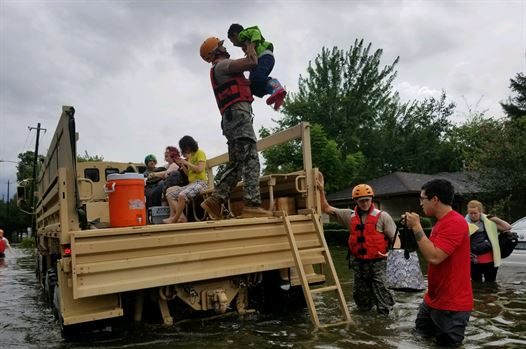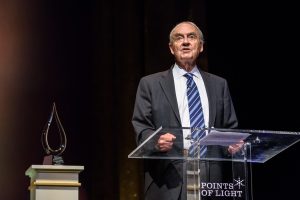More than $275 million has been pledged or raised in the week since Hurricane Harvey dumped 50 inches of rain on the Houston area.
The Rebuild Texas Fund, announced on Friday by Texas Gov. Greg Abbott and backed with matching donations by Michael and Susan Dell, raised more than $38 million over the weekend, with a goal to raise $100 million.
Houston Mayor Sylvester Turner and Judge Ed Emmett established a Hurricane Harvey Relief Fund through the Greater Houston Community Foundation that has raised more than $34 million. Another $22.7 million has been raised through the United Way of Greater Houston’s Harvey Relief Fund.
One of the most prominent fundraisers on social media has been a crowdfunding campaign on YouCaring.com by professional football player J.J. Watt of the Houston Texans. The effort today eclipsed $20 million from more than 182,000 donors and will be administered through his foundation, the Justin J. Watt Foundation.
Corporations have pledged $161 million to relief efforts, including 71 companies that are giving $1 million or more, according to the U.S. Chamber of Commerce.
Michael and Susan Dell committed $24.7 million to the fund, including a match campaign that raised $13.5 million from partners, individuals and business. The Michael and Susan Dell Foundation (MSDF) matched $1 for every $2 raised over the weekend, resulting in $38.2 million:
- $18 million initial investment from Michael and Susan Dell;
- $13.5 million from 12,417 donors; and,
- $6.7 million in matching funds from Michael and Susan Dell.
Almost $4 million more was raised yesterday, bringing the total to $42.8 million as of this morning.
The Rebuild Texas Fund will be housed at the OneStar Foundation, and the Dell Foundation will be contributing significant time, money and expertise. Administrative costs and people costs are covered by the foundations and PayPal has agreed to waive processing fees for donations to the fund, so 100 percent of donations will go toward relief, recovery and rebuilding efforts.
The fund will focus on long-term recovery for when the media spotlight dies down in the region and volunteers and philanthropic dollars become harder to come by, according to Elizabeth Darling, president and CEO of OneStar Foundation. The foundation will work as a fiscal intermediary, housing fund dollars, and will work with the Michael & Susan Dell Foundation to disburse funds and have reporting systems in place to report back to the public.
Darling said that a timeframe has not yet been established for grant making, though the anticipated life expectancy of the fund is to be up to three years. A process of setting parameters for an advisory committee to help inform allocations is underway. Funding will likely be focused toward intermediary organizations with strong local ties, the idea being that such groups would be the most efficient recipients of dollars, according to Darling. Fund priorities include:
- Health and housing;
- Schools and childcare;
- Workforce and transportation; and,
- Raising capital for the rebuilding of the small business community.
Some communities not hit as hard by the storm, such as Corpus Christi, are already preparing rebuilding efforts. Others that were hit harder and later, such as Beaumont, are still under water, Darling said.
A secondary problem that has come out of Harvey has been the influx of unsolicited goods. Communities across the country have sent truckloads of useful supplies, but there is stressed warehouse space in which to store the donations and distribution networks to deliver them. Darling said that nonprofits are asking for cash above all else, but — in the event that a supply donation is more feasible — nonprofits are asking for entities to call ahead before delivering.
Linda Perryman Evans, president and CEO of the Meadows Foundation in Dallas, said that it is still too early to identify the recovery needs of the nonprofit community. As many organizations are in spend mode to handle response, it will likely be the foundation’s roll to backfill and replenish coffers in the aftermath.
Evans noted that a number of Houston-area arts organizations have cancelled performances and have been unable to raise expected revenue. Other organizations are similarly situated after closing down operations. Helping fill those gaps will be one role of the foundation community, she said.
Another will be infrastructure needs as organizations are limping along dealing with their own infrastructure issues while serving their communities. Foundations can roll in with dollars for repairs, she said, citing as an example the repair of animal shelters in Austin after flooding hit the area a few years ago.
Fundraising efforts from individuals and corporations can help in the shorter term, she said, noting that North Texas Giving Day is scheduled for next week and was able to raise $33 million last year, the hope being that Harvey-related consciousness can further help local groups.
It is typically the foundation’s role to help with immediate grants where needed and then take a longer-term approach. A recent call with the Greater Houston Community Foundation, Council on Foundations, and FEMA made it clear that recovery will take years.










